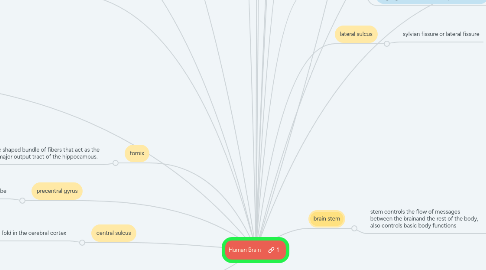
1. premotor cortex
1.1. responsible for dinating learned movements
1.2. controls the Speech center broca's area
2. 5 senses
2.1. sight = ability to see
2.2. sound = ability to hear
2.3. touch = ability to physically feel
2.4. smell = ability to distinguish scent
2.5. taste = ability to taste
3. fornix
3.1. c shaped bundle of fibers that act as the major output tract of the hippocampus.
3.1.1. part of the limbic system
4. precentral gyrus
4.1. surface of the posterior lobe
4.1.1. primary motor complex (brodmann area 4)
5. central sulcus
5.1. fold in the cerebral cortex
5.1.1. central fissure
5.1.1.1. separates the frontal lobe and the parietal lobe and the primary motor complex from the primary somatosensory cortex
6. postcentral gyrus
6.1. located in lateral parietal lobe
6.2. primary somatosensory cortex
6.3. main sensory area for the sense of touch
6.4. map of sensory space in this location called the sensory homunculus
7. diencephalon
7.1. thalamus
7.1.1. largest portion of the brain
7.1.2. contains relay and the processing center for sensory information
7.2. hypothalamus
7.2.1. narrow stalk connects to pituitary gland
7.2.1.1. pituitary gland
7.2.1.1.1. the primary link between nervous and endocrine system
7.2.2. contains centers that involve emotion autonomic functions and hormone production.
7.3. pineal gland (part of the epithalamus)
8. cerebellum
8.1. receives info from the sensory systems the spinal cord and the other parts of the brain and regulates the motor movement
8.1.1. coordinates voluntary movement
8.1.1.1. controls speech ,posture, balance, smooth balance of muscle activity
9. optic chiasm
9.1. formed by the crossing of the optic nerves in the brain
9.2. x-shaped structure
9.3. connects the brain to the eye
9.4. a turning point in evolution
10. parietal lobe
10.1. back of the brain
10.2. divided into two hemispheres
10.3. processing the sensory information regarding the location of pars of the body
10.4. interpreting visual information and processing language and mathematics
11. Somatic sensory Association Area (monitors the Activity in the primary sensory cortex)
12. somatic motor Association area
13. frontal lobe
13.1. part of the brain that controls important cognitive skills
13.2. emotional expression, problem solving, memory, language, judgment, and sexual behaviors
13.3. control panel for our personality and our ways of communication
14. parieto-occipital sulcus
14.1. grove in the cerebral cortex separating the precuneus of the parietal lobe from the cuneus of the occipital lobe on the medial surface of cerebral cortex
14.2. main center for visual processing
15. brain stem
15.1. stem controls the flow of messages between the brainand the rest of the body, also controls basic body functions
15.1.1. pons
15.1.1.1. relay signals from the forebrain to the cerebellum
15.1.1.2. deal primarily with sleep, respiration, Swallowing , bladder control, hearing,equilibrium, taste, eye movement, facial expressions, facial sensation, and even posture
15.1.2. medulla oblongata
15.1.2.1. portion of the hind brain
15.1.2.2. controls the autonomic functions
15.1.2.3. breathing, digestion, heart and blood vessel function,swallowing and sneezing
15.1.2.4. motor and sensory neurons from the midbrain and forebrain travel through the medulla
15.1.2.5. vagus nerve exits from here
15.1.3. midbrain
15.1.3.1. mesencephalon
15.1.3.1.1. region of the developing vertebrate brain composed of the tectum tegmentum
15.1.3.1.2. serves important functions in motor movement
15.1.3.1.3. movements of the eye and the auditory visual processing
16. temporal lobe
16.1. located behind the ear extends to both side of the brain
16.2. involved in vision, memory, sensory input, language, emotion,and comprehension
17. mamillary body
17.1. small round bodies
17.2. located on the under surface of the brain
17.3. part of the diencephalon
17.4. form part of the limbic system
17.4.1. located at the ends of the anterior arches of the formix
